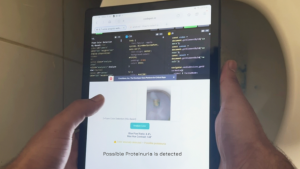Simon Spurr is the CEO of the mobile and web-based smart health platform FOLUP and 30 Day Health. These online health care tools provides patients with a secure, easy to use platform on which they can create their own electronic health records by tracking symptoms, response to medication and mood. The platform also connects patients to doctors, improving patient care and satisfaction.
The name of the platform FOLUP is a play on the words “follow up”, and has been designed to help patients track their own health between consultations with their doctors. The app is free to use and was originally launched in Europe and the US in 2012. Since its launch, it has been brought to Africa to try to help solve problems that arise when trying to provide more accessible health care to largely rural populations.
Many people in the developing world have mobile phones and mobile technology is fast becoming the key to efficient health care.
“In Africa we are faced with a huge challenge: remote distances between patients and providers and access to good healthcare facilities. Technology can cross these bridges and really reduce the divide,” says Spurr, “and give the patient the ability to really take control of their health.”
Spurr recently launched another ehealth platform called 30 Day Health. Similar to FOLUP, 30 Day Health uses a technology platform that allows the patient to communicate better with their health care providers when they have been discharged from hospital, keeping them from being readmitted unnecessarily. The platform is targeted primarily towards users in the United States, where hospitals or health care providers can be penalised for readmitting patients within a period of 30 days unnecessarily.
The platform uses simple methodologies to keep the patient on the path to recovery: reminders to take medications, the ability to send messages to home-visiting nurses in the area, and the ability to track symptoms.
“Digital health is here, technology is here and it is here to stay. So funders, insurers, hospitals groups, and doctors need to adopt technologies and patients need to be managed better.”







